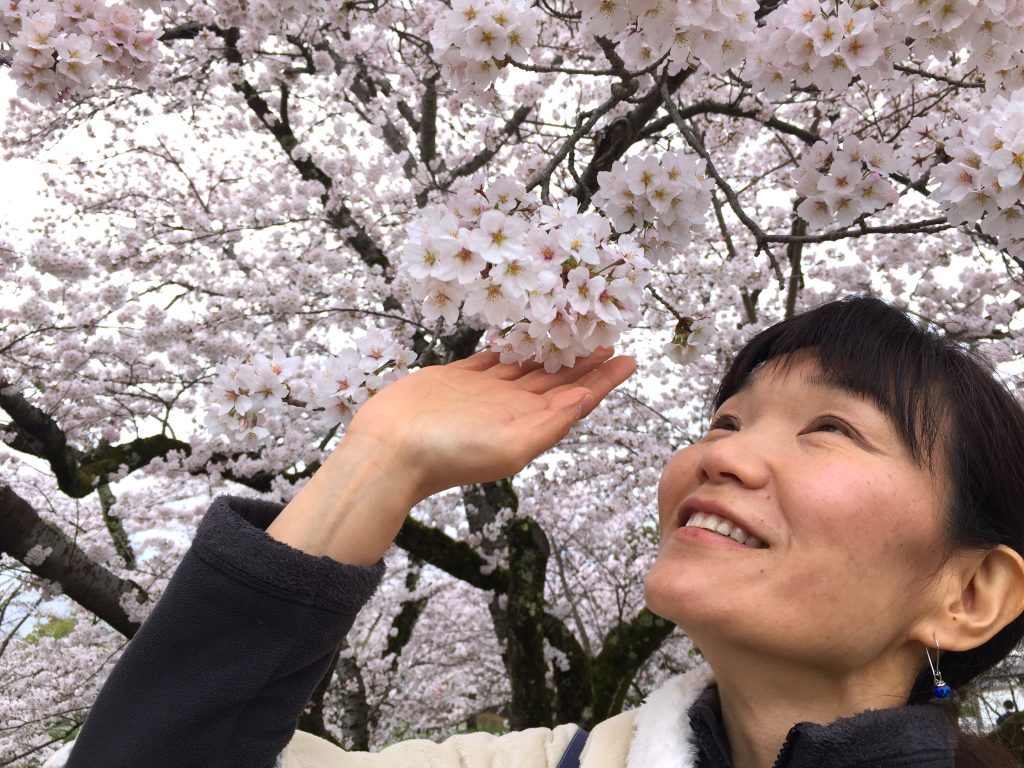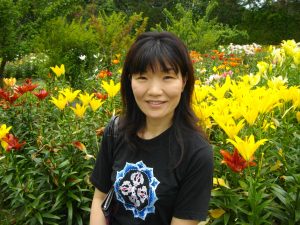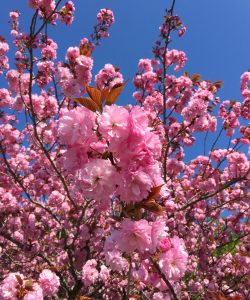
“The awareness is spreading like clouds of pollen in the spring.”
That was a comment I made on a progressive website about the worldwide demonstrations, street protests, and rallies celebrating this year’s Earth Day.
I must confess that until two weeks ago I had a highly prejudiced understanding and appreciation of pollen. I associated it with red, runny noses, puffy, squinting eyes, an annual epidemic of misery among a sizeable chunk of the population. This limited and highly negative view was shaped by thousands of ads for over-the-counter remedies which had been embedded in my brain, probably from my first days of watching TV as a child.
Of course, a little basic biology is a powerful corrective. We find that pollen is the delivery mechanism of male sperm cells for plants. Pollination is about reproduction. It’s how vast landscapes are turned into breathtaking fields of flowering plants, a floral explosion that here in Japan transforms the whole country into a beautiful garden stretching sea to sea.
My awakening, however, did not come from a text book. It came — as is quite common these days — from my lovely and truly brilliant Japanese wife.
 Masumi and I were on our way to an outdoor market in a nearby town. It was at the peak of the cherry blossom season. Cherry blossoms here are not confined to parks or community malls. Tens of thousands of cherry blossom trees line roads, rivers, canals, and crisscross fields of rice and other crop plantings. It’s absolutely spectacular.
Masumi and I were on our way to an outdoor market in a nearby town. It was at the peak of the cherry blossom season. Cherry blossoms here are not confined to parks or community malls. Tens of thousands of cherry blossom trees line roads, rivers, canals, and crisscross fields of rice and other crop plantings. It’s absolutely spectacular.
However, I mentioned casually to her that is seemed a little hazy that day. We’re downwind from the China mainland, which hosts many coal-fed power plants, heavy-industry factories, and the like, so I just assumed it was the usual dust and smoke blowing our way from our Chinese neighbor.
“No, that’s pollen,” explained Masumi. She directed my gaze to the face of a forested mountain we were passing. There was a huge puff of what appeared to be smoke, but not really the color of smoke, or the way smoke looks rising from burning debris. No, it was a cloud of pollen, which was being released in that section of the forest, I assume from the floral undergrowth beneath the trees.
Thus began my quick education and new respect for pollen. That cloud was the promise for the continuing regeneration of the awe-inspiring bouquet we and others across Japan were now enjoying.
Okay. I believe in balanced reporting. So let me explore the other side of this story.
Some folks are allergic to pollen. Those ads for over-the-counter remedies turn their misery into cold, hard cash for the manufacturers of these palliatives. Point taken.
 But there are others who don’t have this excuse. These are folks who choose to seal themselves up in an artificial cocoon, stare at flat-panel displays, thus have no idea about clouds of pollen, pollination, flowers, or anything that doesn’t conflate with living under artificial light, being captive of a hermetically sealed environment; no concept of a reality which doesn’t adhere to and reify the rules of commerce and commodification of everything. This is the model embraced by an economy-fixated society, which exclusively views humans as components of monetary mechanisms, consequently only values them as producers and/or consumers.
But there are others who don’t have this excuse. These are folks who choose to seal themselves up in an artificial cocoon, stare at flat-panel displays, thus have no idea about clouds of pollen, pollination, flowers, or anything that doesn’t conflate with living under artificial light, being captive of a hermetically sealed environment; no concept of a reality which doesn’t adhere to and reify the rules of commerce and commodification of everything. This is the model embraced by an economy-fixated society, which exclusively views humans as components of monetary mechanisms, consequently only values them as producers and/or consumers.
I would surmise the notion of beauty for such champions of greed is skyrocketing returns on investments and a bulging portfolio of winning stocks. I seriously doubt either of those has much of a fragrance though I may have on occasion heard someone say: “That person smells of money.”
For these individuals, flowers are “beautiful” depending on how marketable they are and what sort of profits they produce. With no sense of irony, they would deem the distress of those allergy sufferers as an opportunity to turn a profit. The more misery these folks have to endure, the better the prospects for some fat returns on pharmaceutical stocks.
We’re told that this is the new way to look at the world. Those old valuations — meaning just the basic use of our senses, and gauging the world around us by the joy and delight we feel in our hearts — are passé, and have been replaced by the new tools of capitalism, the free market, and the now dominant neoliberal paradigm.
Yet, the Earth day protests and celebrations convincingly offered a very different message. That message was loud and unambiguous. Treating the Earth as a factory for man-made goods, narrowing the contribution of human beings to merely producing and consuming those goods, subjecting everything from happiness and love to the value of a human life, only to the metrics of economic worth, reducing all of the potential for human creativity, ingenuity, compassion, nobility, vision, altruism, excellence, and achievement, to mere numbers on a spread sheet, is suffocating the human race, exterminating the human family, eviscerating the human spirit, and destroying the planet.
I’ve made my choice. It took me a while to come around.
I’ll take my chances with the clouds of pollen.




Life In Japan: Clouds of Pollen in the Spring
“The awareness is spreading like clouds of pollen in the spring.”
That was a comment I made on a progressive website about the worldwide demonstrations, street protests, and rallies celebrating this year’s Earth Day.
I must confess that until two weeks ago I had a highly prejudiced understanding and appreciation of pollen. I associated it with red, runny noses, puffy, squinting eyes, an annual epidemic of misery among a sizeable chunk of the population. This limited and highly negative view was shaped by thousands of ads for over-the-counter remedies which had been embedded in my brain, probably from my first days of watching TV as a child.
Of course, a little basic biology is a powerful corrective. We find that pollen is the delivery mechanism of male sperm cells for plants. Pollination is about reproduction. It’s how vast landscapes are turned into breathtaking fields of flowering plants, a floral explosion that here in Japan transforms the whole country into a beautiful garden stretching sea to sea.
My awakening, however, did not come from a text book. It came — as is quite common these days — from my lovely and truly brilliant Japanese wife.
However, I mentioned casually to her that is seemed a little hazy that day. We’re downwind from the China mainland, which hosts many coal-fed power plants, heavy-industry factories, and the like, so I just assumed it was the usual dust and smoke blowing our way from our Chinese neighbor.
“No, that’s pollen,” explained Masumi. She directed my gaze to the face of a forested mountain we were passing. There was a huge puff of what appeared to be smoke, but not really the color of smoke, or the way smoke looks rising from burning debris. No, it was a cloud of pollen, which was being released in that section of the forest, I assume from the floral undergrowth beneath the trees.
Thus began my quick education and new respect for pollen. That cloud was the promise for the continuing regeneration of the awe-inspiring bouquet we and others across Japan were now enjoying.
Okay. I believe in balanced reporting. So let me explore the other side of this story.
Some folks are allergic to pollen. Those ads for over-the-counter remedies turn their misery into cold, hard cash for the manufacturers of these palliatives. Point taken.
I would surmise the notion of beauty for such champions of greed is skyrocketing returns on investments and a bulging portfolio of winning stocks. I seriously doubt either of those has much of a fragrance though I may have on occasion heard someone say: “That person smells of money.”
For these individuals, flowers are “beautiful” depending on how marketable they are and what sort of profits they produce. With no sense of irony, they would deem the distress of those allergy sufferers as an opportunity to turn a profit. The more misery these folks have to endure, the better the prospects for some fat returns on pharmaceutical stocks.
We’re told that this is the new way to look at the world. Those old valuations — meaning just the basic use of our senses, and gauging the world around us by the joy and delight we feel in our hearts — are passé, and have been replaced by the new tools of capitalism, the free market, and the now dominant neoliberal paradigm.
Yet, the Earth day protests and celebrations convincingly offered a very different message. That message was loud and unambiguous. Treating the Earth as a factory for man-made goods, narrowing the contribution of human beings to merely producing and consuming those goods, subjecting everything from happiness and love to the value of a human life, only to the metrics of economic worth, reducing all of the potential for human creativity, ingenuity, compassion, nobility, vision, altruism, excellence, and achievement, to mere numbers on a spread sheet, is suffocating the human race, exterminating the human family, eviscerating the human spirit, and destroying the planet.
I’ve made my choice. It took me a while to come around.
I’ll take my chances with the clouds of pollen.